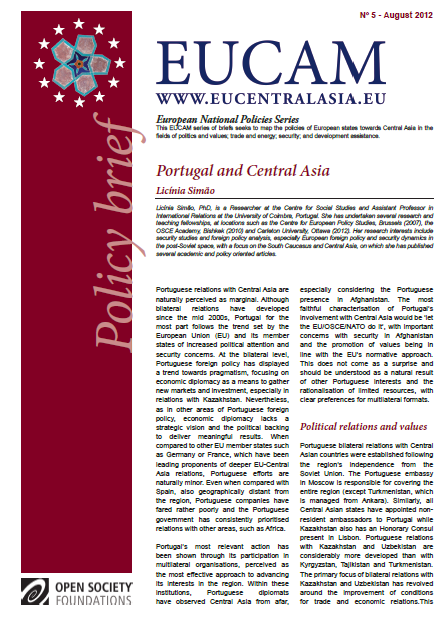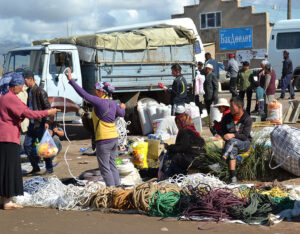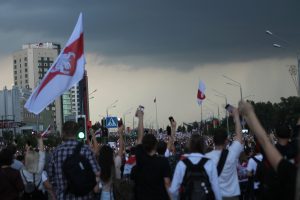European National Policies Series – Portugal and Central Asia

Download “European National Policies Series - Portugal and Central Asia”
EUCAM-National-Policies-Series-5.pdf – Downloaded 350 times – 1.18 MBPortuguese relations with Central Asia are naturally perceived as marginal. Although bilateral relations have developed since the mid 2000s, Portugal for the most part follows the trend set by the European Union (EU) and its member states of increased political attention and security concerns. At the bilateral level, Portuguese foreign policy has displayed a trend towards pragmatism, focusing on economic diplomacy as a means to gather new markets and investment, especially in relations with Kazakhstan. Nevertheless, as in other areas of Portuguese foreign policy, economic diplomacy lacks a strategic vision and the political backing to deliver meaningful results. When compared to other EU member states such as Germany or France, which have been leading proponents of deeper EU-Central Asia relations, Portuguese efforts are naturally minor. Even when compared with Spain, also geographically distant from the region, Portuguese companies have fared rather poorly and the Portuguese government has consistently prioritised relations with other areas, such as Africa.
Portugal’s most relevant action has been shown through its participation in multilateral organisations, perceived as the most effective approach to advancing its interests in the region. Within these institutions, Portuguese diplomats have observed Central Asia from afar, especially considering the Portuguese presence in Afghanistan. The most faithful characterisation of Portugal’s involvement with Central Asia would be ‘let the EU/OSCE/NATO do it’, with important concerns with security in Afghanistan and the promotion of values being in line with the EU’s normative approach. This does not come as a surprise and should be understood as a natural result of other Portuguese interests and the rationalisation of limited resources, with clear preferences for multilateral formats.
Political relations and values
Portuguese bilateral relations with Central Asian countries were established following the region’s independence from the Soviet Union. The Portuguese embassy in Moscow is responsible for covering the entire region (except Turkmenistan, which is managed from Ankara). Similarly, all Central Asian states have appointed non-resident ambassadors to Portugal while Kazakhstan also has an Honorary Consul present in Lisbon. Portuguese relations with Kazakhstan and Uzbekistan are considerably more developed than with Kyrgyzstan, Tajikistan and Turkmenistan. The primary focus of bilateral relations with Kazakhstan and Uzbekistan has revolved around the improvement of conditions for trade and economic relations.This situation is illustrative of the lack of investment devoted to bilateral relations by both Portugal and the states in the region. Nevertheless, relations have been consolidated over the last years, particularly through a series of bilateral meetings between Portuguese and Central Asian officials.
Visits by Portuguese officials to the region have been promoted in the framework of Lisbon’s diplomatic actions in multilateral contexts. The first visits took place in 2001-2002, during the Portuguese Chairmanship of the Organisation for Security and Co-Operation in Europe (OSCE) and then in 2009 the Portuguese foreign minister, Luís Amado, travelled to Uzbekistan and Tajikistan and later to Uzbekistan and Kazakhstan in 2010. The latter visits were prepared in the framework of the first EU-Central Asia Security Forum. Portuguese diplomacy was also particularly active at the time, preparing the 2010 NATO Lisbon Summit and sought to capitalise on these meetings, both for trade and economic objectives and broader security concerns shared with western allies. Furthermore, Portugal at the time was campaigning for a non-permanent seat at the United Nations (UN) Security Council and such visits served the purpose of gathering support among the region for Lisbon’s application. Current Portuguese minister of foreign affairs, Paulo Portas, carried out the most recent visit to the region on 30 June 2012, once more with a strong economic agenda.
Overall, these visits have resulted in the early development of a network of bilateral agreements on diplomatic exchanges and economic cooperation. Portugal has actively supported the successful Kazakh bid to take on the OSCE Chairmanship and pushed for closer interactions between the OSCE and NATO goals in Afghanistan moreover. Reflecting upon the rather unbalanced nature of these political relations, the only head of state from Central Asia who has ever visited Portugal is President Nursultan Nazarbaev of Kazakhstan during November 2010, within the framework of the NATO Lisbon summit. Confirming Kazakhstan’s prominence in relations between Portugal and Central Asia, the Kazakh deputy foreign minister also visited Lisbon in March 2012.
According to one official at the Portuguese Ministry of Foreign Affairs, human rights issues are regarded as a horizontal concern in all areas of interactions – especially promoted in the framework of the EU rather than at bilateral level. Portugal therefore, has privileged a position of ‘transformation through engagement’, even when recognising the difficulties of the EU in keeping its normative foreign policy towards the region. This position illustrates a concern with human development and democratic legitimacy issues, within the framework of EU and OSCE relations with Central Asia, perceived by the Portuguese ministry of foreign affairs as fundamental for long-term regional stability.
In the framework of the EU, Portugal has supported the reinforcement of political, economic and trade relations between EU member states and the region. One diplomatic source underlined the need for a more active promotion of democracy, human rights and the rule of law by the EU in the region, in order to address the erosion of legitimacy by Central Asian leaders and the potential instability that could bring for domestic and regional security. Thus, Portugal has supported the establishment of a regular high level EU-Central Asia security dialogue, as part of the regional political dialogue.
Trade and energy
Trade relations between Portugal and Central Asia remain minimal, with both Kazakhstan and Uzbekistan standing out as the most active economic partners. Relations with Kyrgyzstan have been hampered by the political instability in the country, first in 2005 and then again in 2010 – increasing the risk for potential Portuguese investments. Economic relations with Tajikistan are also rather slight, mainly due to the limited opportunities of its domestic market and risk perception linked to the war in Afghanistan. Portugal displayed some interest in investing in hydropower production in Tajikistan and exchanging better practices in water dispute management, but no concrete participation has been decided. Turkmenistan is the country of the region where Portugal has the least developed bilateral relations, but the Portuguese secretary of state for foreign affairs nonetheless made an official visit in 2010, during the Portuguese campaign for a non-permanent seat at the UN Security Council.
One of the most significant Portuguese investments in Central Asia is through the Partex-Oil and Gas Company. Since 1994, Partex has been involved in the development of the Dunga field production in Kazakhstan in partnership with Oman-oil and Maersk, from Norway. Since 2002 Partex has been the leading partner operating in the field, controlling 60 per cent of the consortium. This participation however, is not overly substantial and takes place in one of the smaller Kazakh fields in the Caspian, bestowing Partex limited influence as a regional actor with no direct implications concerning Nabucco or Southern Corridor plans. According to one official at the Portuguese foreign ministry, Portugal supports projects of energy diversification for Europe in principle, but follows the mainstream European positions in many of the issues pertaining to the region.
| Central Asian Country | Exports to Portugal | Imports from Portugal |
| Kazakhstan | 14th | 130th |
| Uzbekistan | 93rd | 159th |
Source: table compiled from data gathered by the Portuguese Institute of National Statistics.
Trade relations with Uzbekistan have too been minimal and haphazard. Between 2004 and 2008, the number of Portuguese companies exporting to Uzbekistan varied between three and seven, illustrating clearly the limited relations in place.Portuguese exports concentrate on products such as cork, wood, and machinery used in cotton spinning, amongst others. Portuguese imports from Uzbekistan are mainly composed of raw materials, namely cotton (99.4 percent in 2010) which, despite criticism by the European Parliament and Human Rights organisations, has been included in the generalised system of preferences negotiated between the European Commission and the authorities in Tashkent. Trade relations with Kazakhstan are more diversified, but still somewhat lacking. In 2009, 22 Portuguese companies exported to Kazakhstan and the number of Portuguese companies importing from that country is sharply declining (15 companies in 2008 and a mere seven in 2009). According to data available from the Portuguese Agency for Investment and External Trade (AICEP), the main product imported by Portugal is oil and its derivative products.
Such limited trade relations with these two Central Asian partners have been addressed by both sides. Portugal has included economic delegations in its official visits, namely businessmen and entrepreneurs already involved with the region and new potential traders, including those working in renewable energies and construction companies. Business seminars by Kazakhstan and Uzbekistan have been held in Lisbon, seeking to attract Portuguese investment and to encourage the transfer of knowledge. The Honorary Consul of Kazakhstan in Portugal has been particularly effusive in promoting these events, amplifying the Kazakh objective of broadening its relations with all EU member states and modernising the country. The first such meeting took place in December 2011, following the initiative of the Kazakh embassy in Paris and as a follow up, AICEP formed a commercial delegation to travel with the Portuguese foreign affairs minister on 30 June 2012 to Astana. Following the Portuguese foreign minister’s 2009 visit to Tashkent, a business seminar was also organised in Lisbon, headed by the Uzbek deputy minister of foreign economic relations, investments and trade. The latest effort to reinforce economic relations between the two countries has been led by the new Portuguese ambassador to Moscow, who has underlined the strategic importance of the ‘Navoi’ free industrial economic zone and ‘Angren’ special industrial zone as a means to provide appealing conditions for hightech investments by Portugal, including Portuguese companies already active in Russia(1).
Security
Due to the geographical distance, there are no direct security threats to Portugal from Central Asia. The Portuguese authorities have however, remained strongly committed to the stabilisation of Afghanistan as set out in the framework of the International Security Assistance Force (ISAF). Such authorities regard the potential instability, which the withdrawal of the United States’ military forces from Afghanistan by 2014 might bring to Central Asia, as a priority for EU relations with the region. Portugal maintains a military contribution in Afghanistan, which is mainly located at the regional command centre around Kabul. Portugal therefore, is concerned with issues such as terrorism and insurgent groups using Central Asia as a safe haven for violent activities against international forces in Afghanistan. Thus, Portugal has supported greater efforts in the framework of the EU, NATO and the OSCE to reinforce border control mechanisms and migration management.
Naturally, the use of Central Asia as a route for the drug trade from Afghanistan and its negative impacts for Europe, poses an indirect challenge and a concern to Portugal regarding political instability and energy security. Due to the limited strategic interests of Portugal in the region, which are more directly related to the security of transit routes supplying ISAF forces, there has been no security-related activity at a bilateral level. Foreign affairs officials have portrayed security issues as best addressed in the framework of NATO and the EU.
Besides the hard security concerns with Afghanistan, Portugal has also displayed a willingness to support the multilateral organisations, of which it is a member, in their crisis management efforts in the region. According to a Portuguese official at the OSCE, Portugal supported politically the deployment of the OSCE police mission to Kyrgyzstan, following the crisis in 2010. This is part of a broader understanding of regional security, where political institutions need to be revitalised and strengthened.
Development assistance
Portugal does not provide bilateral development assistance to Central Asia. As previously mentioned, Portugal has previously made its assistance available to Tajikistan and Uzbekistan to improve technical standards in water management between the two countries, but no concrete measures have since been agreed. Portugal has also contributed to the United Nations Development Programme (UNDP) Trust Fund, and in 2010 and 2011 made financial contributions to the OSCE Academy in Bishkek (€20,000 and €7,750 respectively).
This limited commitment to development aid to Central Asia results on the one hand both from the financial constraints bearing down on Portuguese development assistance budgets, but also on the other, from traditional prioritisation of Africa and of the Portuguese-speaking countries in Portuguese development assistance. This is also visible in the careful concern expressed by Portuguese diplomats, with avoiding any reduction of EU assistance to Africa. Thus, Portuguese diplomats in the EU have a clear mission of assuring that EU assistance to Central Asia, or elsewhere, is not increased at the expense of EU assistance to Africa.
At a civil society level there are no well-established collaborations. The same is true for universities, which still remain in the early stages of developing exchange agreements with the region under the Tempus programme. A lack of knowledge about the region, as well as security and quality related concerns have limited the development of these agreements. There has also been interest in linking Portuguese universities to the Aga Khan Foundation educational project in Central Asia and the University of Central Asia, but no partnership has been established so far.
Conclusion
For the foreseeable future, Portugal’s contribution to EU-Central Asia relations will remain limited. Portuguese foreign policy priorities primarily lie in Brazil and Africa, where Lisbon believes it brings added value to the shaping of European approaches. On Central Asia, Portugal follows the mainstream positions within the EU on these matters, since these countries are not a priority for the Portuguese Foreign Ministry.
Relations with Kazakhstan are indeed the most developed, however owing to Partex’s minor presence in the Caspian, little political impact is expected regarding energy security issues. The rather depoliticised relations with the region and Portugal’s preference for multilateral formats can in principle increase scope for more normative approaches, regarded by Portuguese officials as important contributions to regional stability. Overall, the ability of Portugal to steer EU-relations with Central Asia in specific directions will remain small, and dependent to a large extent on the individual interest of Portuguese diplomats in multilateral forums to engage more with the region.
- Ministry of Foreign Affairs of the Republic of Uzbekistan, Meeting with Ambassador of Portugal,25 May 2012, http://mfa.uz/eng/press_and_media_service/news_and_events/meeting_with_ambassador_of_portugal.mgr, accessed 12 June 2012.
Download “European National Policies Series - Portugal and Central Asia”
EUCAM-National-Policies-Series-5.pdf – Downloaded 350 times – 1.18 MB






